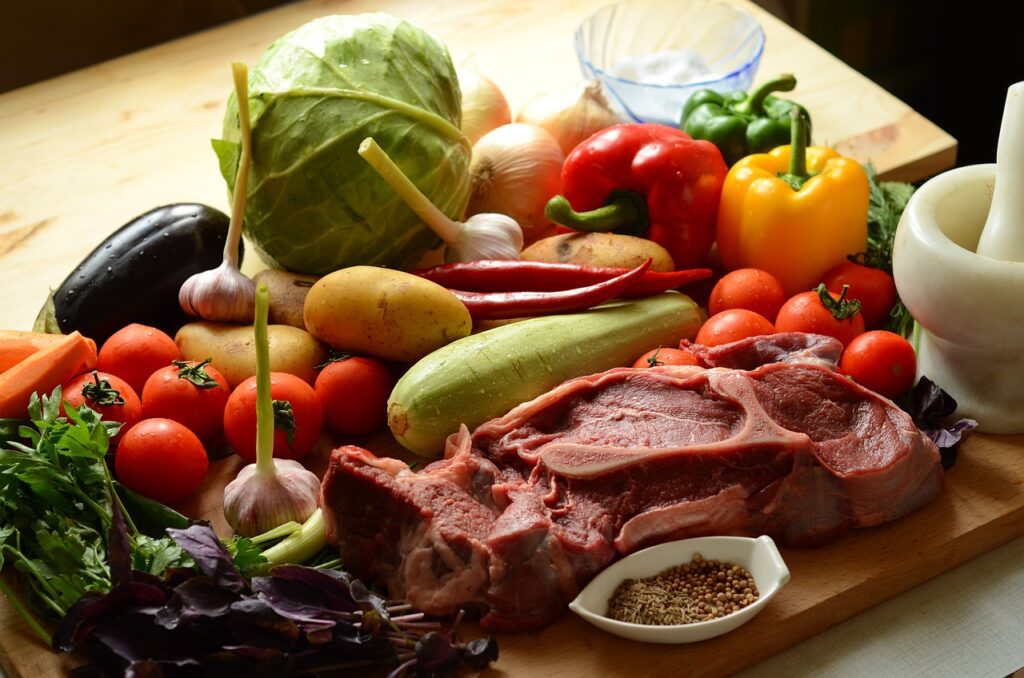Creating homemade dog food can be a rewarding experience, ensuring your furry friend receives nutritious and balanced meals. In this blog, we will explore the essential ingredients and guidelines for crafting healthy homemade dog food recipes that cater to your dog’s dietary needs. Table of Contents 🍖 Introduction to Homemade Dog Food Homemade dog food offers a fantastic opportunity to provide your pet with the freshest, most nutritious meals possible. Many pet owners are increasingly aware of the benefits of cooking for their dogs. Making food at home allows you to control the quality of ingredients and tailor meals to meet your dog’s specific needs. Transitioning to homemade dog food can be straightforward. Start by understanding the essential components that make up a balanced diet. This knowledge empowers you to craft meals that support your dog’s health and vitality. Why Homemade? Commercial dog foods can contain fillers, preservatives, and low-quality ingredients. By preparing meals at home, you can ensure that every ingredient is fresh and beneficial. This not only enhances your dog’s health but also strengthens the bond between you and your furry friend. 🥗 The Importance of Nutritional Balance Nutritional balance is crucial for your dog’s overall health. A well-rounded diet should include proteins, carbohydrates, fats, vitamins, and minerals. Each component plays a significant role in maintaining your dog’s health and well-being. Without proper balance, your dog may suffer from deficiencies or health issues. Therefore, understanding how to achieve this balance is essential for any pet owner looking to prepare homemade meals. Key Nutritional Components 🍗 Choosing Quality Proteins Proteins are the cornerstone of your dog’s diet. They provide essential amino acids necessary for growth, maintenance, and overall health. When selecting proteins, prioritize high-quality sources. Lean meats such as chicken, turkey, and beef are excellent choices. Eggs also serve as a fantastic protein source, rich in amino acids. Aim to make animal protein the primary ingredient in your homemade recipes. Tips for Choosing Proteins 🥔 Incorporating Healthy Carbohydrates While dogs are primarily carnivorous, incorporating healthy carbohydrates into their diet can be beneficial. Carbohydrates provide energy and essential nutrients that support overall health. Common healthy carbohydrate options include sweet potatoes, brown rice, and oats. These ingredients not only supply energy but also offer fiber, which is vital for digestive health. Benefits of Healthy Carbohydrates 🛢️ The Role of Fats in Dog Nutrition Fats are an essential part of your dog’s diet, providing a concentrated energy source and supporting various bodily functions. They play a key role in nutrient absorption and maintaining healthy skin and coat. When choosing fats, focus on healthy sources like fish oil, flaxseed oil, and sunflower oil. These fats not only provide energy but also contain essential fatty acids that contribute to overall health. Types of Healthy Fats 🐟 Adding Omega-3 Fatty Acids Omega-3 fatty acids are crucial for maintaining your dog’s health. They support brain function, reduce inflammation, and promote a shiny coat. Incorporating these fatty acids into your dog’s diet can yield significant health benefits. Sources of Omega-3 include fish oil, flaxseed oil, and krill oil. When adding these to your homemade recipes, ensure you follow recommended dosages for optimal results. How to Incorporate Omega-3s 🦴 The Necessity of Calcium Calcium is vital for your dog’s health, particularly for bone development and maintenance. If you’re not feeding bones, it’s essential to include a calcium supplement in your homemade diet. Ground eggshells are an economical and effective calcium source. After cleaning and roasting the shells, grind them down to a fine powder and add them to your dog’s food. Calcium Guidelines 🥦 Including Vegetables for Vitamins and Minerals Vegetables are a crucial component of homemade dog food. They provide essential vitamins and minerals that help support your dog’s immune system, digestion, and overall health. Including a variety of vegetables ensures your dog receives a broad spectrum of nutrients. Dark leafy greens, carrots, and peas are excellent choices. These vegetables are rich in vitamins A, C, and K, as well as minerals like potassium and magnesium. When preparing your dog’s meals, aim for a colorful mix to maximize nutrient intake. Best Vegetables for Your Dog 🌾 The Importance of Fiber Fiber plays a vital role in your dog’s diet. It aids in digestion, promotes gut health, and can help maintain a healthy weight. Including fiber-rich foods in your dog’s meals can prevent constipation and contribute to overall digestive health. Sources of fiber include vegetables, fruits, and whole grains. For homemade dog food, consider incorporating ingredients like pumpkin, sweet potatoes, and ground flaxseed to boost fiber content. Benefits of Fiber for Dogs 💊 Vitamins and Minerals Overview Vitamins and minerals are essential for your dog’s overall health and well-being. They support various bodily functions, including metabolism, immune response, and bone health. A balanced homemade diet should include a variety of these nutrients to ensure optimal health. Key vitamins to focus on include vitamins A, D, E, and B vitamins. Minerals such as calcium, phosphorus, iron, and zinc are also crucial. Each of these nutrients plays a unique role in maintaining your dog’s health. Essential Vitamins and Their Benefits Key Minerals and Their Functions 🧪 Simplifying the Process with Supplements For pet owners who want to ensure their dogs receive all necessary nutrients, supplements can be a practical solution. High-quality multivitamins and mineral supplements can help fill any nutritional gaps in homemade diets. Consider using a comprehensive canine multivitamin that includes essential vitamins, minerals, and fatty acids. This can simplify meal preparation and ensure your dog’s nutritional needs are met without the hassle of tracking every nutrient individually. Choosing the Right Supplements 📝 Conclusion and Further Resources Creating balanced homemade dog food is a rewarding process that can significantly enhance your dog’s health. By incorporating quality proteins, carbohydrates, healthy fats, and a variety of vitamins and minerals, you can ensure your furry friend receives the nutrition they need. For further guidance, consider consulting with a veterinarian or a pet nutritionist. They can provide tailored advice based on your










